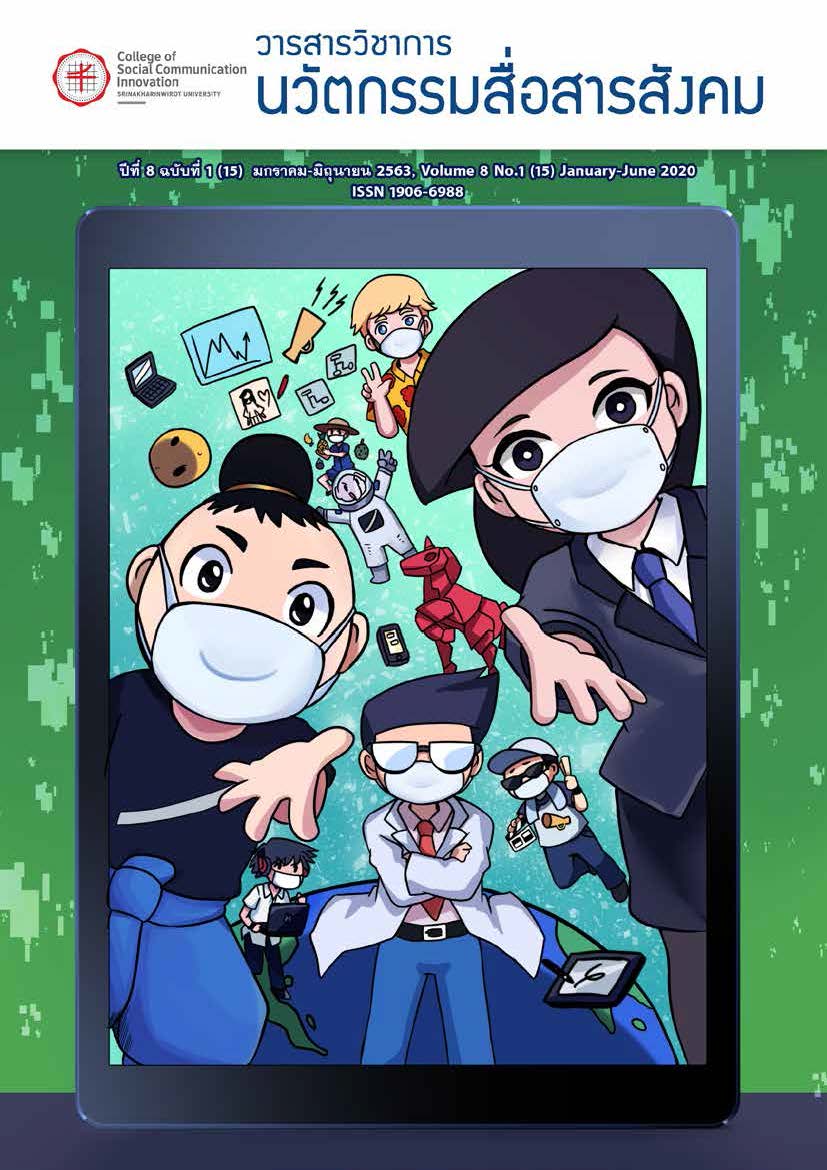แพลตฟอร์มดิจิตอลในการพัฒนากรอบความคิดแบบเติบโตและการคาดการณ์ของตนเองที่ส่งผลให้เกิดขึ้นจริง เพื่อส่งเสริมการรับรู้ความสามารถของตนเองของนักศึกษาสหกิจศึกษา
คำสำคัญ:
กรอบความคิดแบบเติบโต, การคาดการณ์ของตนเองที่ส่งผลให้เกิดขึ้นจริง, การรับรู้ความสามารถของตนเอง, การบันทึกสะท้อนการเรียนรู้ออนไลน์, การประชุมกลุ่มย่อยออนไลน์บทคัดย่อ
การวิจัยครั้งนี้มีวัตถุประสงค์ ดังต่อไปนี้ (1) เพื่อออกแบบและพัฒนาแพลตฟอร์มดิจิตอลในการพัฒนากรอบความคิดแบบเติบโตและการคาดการณ์ของตนเองที่ส่งผลให้เกิดขึ้นจริง เพื่อส่งเสริมการรับรู้ความสามารถของตนเองของนักศึกษาสหกิจศึกษา และ (2) เพื่อทดสอบผลของแพลตฟอร์มดิจิตอลในการพัฒนากรอบความคิดแบบเติบโตและการคาดการณ์ของตนเองที่ส่งผลให้เกิดขึ้นจริง ต่อการรับรู้ความสามารถของตนเองของนักศึกษาสหกิจศึกษา งานวิจัยครั้งนี้เป็นงานวิจัยแบบผสม กึ่งทดลอง มีกลุ่มทดลอง และ กลุ่มควบคุม เป็นนักศึกษาสหกิจศึกษาจำนวนทั้งหมด 72 คน การออกแบบและพัฒนากระบวนการใช้ ADDIE Model เครื่องมือวิจัยที่ใช้ในการรวบรวมข้อมูลเชิงปริมาณคือ แบบสอบถามเพื่อวัดการรับรู้ความสามารถของตนเองของนักศึกษาสหกิจศึกษาทั้งก่อนและหลังการปฏิบัติสหกิจศึกษา โดยใช้สถิติการทดสอบความแตกต่างของค่าเฉลี่ย การทดสอบความแตกต่างระหว่างกลุ่ม และข้อมูลเชิงคุณภาพรวบรวมจากกระบวนการที่ได้พัฒนาขึ้น ประกอบด้วย (1) การอบรมเรื่องกรอบความคิดแบบเติบโตและการคาดการณ์ของตนเองที่ส่งผลให้เกิดขึ้นจริง (2) การบันทึกสะท้อนการเรียนรู้ออนไลน์ (3) การประชุมกลุ่มย่อยออนไลน์ และ (4) การสัมภาษณ์รายบุคคล โดยใช้สถิติการวิเคราะห์เนื้อหาของข้อมูลเชิงคุณภาพ
ผลการวิจัยพบว่า การรับรู้ความสามารถของตนเองของนักศึกษาสหกิจศึกษาในกลุ่มทดลองมีความแตกต่างอย่างมีนัยสำคัญที่ระดับ p<.001 ในขณะที่กลุ่มควบคุมไม่มีความแตกต่างอย่างมีนัยสำคัญ แสดงให้เห็นว่ากระบวนการมีผลต่อการรับรู้ความสามารถของตนเองของนักศึกษาสหกิจศึกษา ผู้วิจัยจึงเสนอให้นำกระบวนการนี้ไปใช้กับนักศึกษาที่ไปปฏิบัติสหกิจศึกษาโดยให้ความสำคัญกับ (1) การประยุกต์ใช้ทุกขั้นตอนของกระบวนการร่วมกัน (2) การใช้แพลตฟอร์มแลกเปลี่ยนเรียนรู้ดิจิทัลและเครื่องมือออนไลน์ (3) การมีส่วนร่วมของโค้ช ผู้นิเทศงานในสถานประกอบการ และอาจารย์นิเทศ และ (4) การส่งเสริมการสะท้อนคิดของนักศึกษาตลอดกระบวนการทั้งก่อน ระหว่าง และหลังการปฏิบัติสหกิจศึกษา
เอกสารอ้างอิง
Auten, M. (2013). Helping Educators Foster a Growth Mindset in Community College Classrooms. Doctoral Dissertation, Walden University.
Bamburg, J. D. (1994). Raising Expectation to improve student learning. Washington: North Central Regional Educational Laboratory.
Blackwell, L. S., Trzesniewski, K. H., & Dweck, C. S. (2007). Implicit Theories of Intelligence Predict Achievement Across an Adolescent Transition: A Longitudinal Study and an Intervention. Child Development 78(1): 246-263 [On-line]. Available: http://doi.org/10.1111/j.1467-8624.2007.00995.x.
Cogdill, S. H. (2013). The identification of factors contributing to first-year college students' mindset of singing ability, and the relationship of that mindset to intent to participate in singing activities. Ph.D. Dissertation, University of Nebraska.
Desta, D., Chalchisa, D., Mulat, Y., & Berihun, A. (2009). Enhancing Active Learning through Self- and- Peer Reflections: The Case of Selected schools in Ethiopia. Journal of International Cooperation in Education 12(1): 71-87.
Dweck, C. S. (2008). Mindset. New York: Ballantine Books.
Eames, C., & Cates, C. (2011). Theories of Learning in Cooperative and Work-Integrated Education. In International Handbook for Cooperative & Work-Integrated Education (2nd ed.). Massachusetts: World Association for Cooperative Education Inc.
Fegley, A. D. (2010). Cultivating a growth mindset in students at a high -achieving high school. Doctoral Dissertation, University of Delaware.
Fingon, J. C., & Fingon, S. D. (2008). Using science journals to encourage all students to write. Science Scope 32(3): 41-45.
Gibbs, G. (1988). Learning by Doing, A Guide to Teaching and Learning Methods [On-line]. Available: https://www.brookes.ac.uk/services/ocsld.
Hansen, T. (2016). Evaluation of successful practices that lead to resiliency, grit, and growth mindsets among at-risk students. Doctoral Dissertation, Northwest Nazarene University.
Haynes, N. M. (1978). The Influence of the Self-fulfilling Prophecy on the Academic Achievement and Self-concept of Black Marginal College Students. Ph.D. Dissertation, Howard University.
Heyward-Evans, M. (2003). The impact of the self -fulfilling prophecy on student achievement in Title One schools. Doctoral Dissertation, South Carolina State University.
Kolb, D. A., Boyatzis, R. E., & Mainemelis, C. (1999). Experiential Learning Theory: Previous Research and New Directions [On-line]. Available: https://learningfromexperience.com/downloads/research-library/experiential-learning-theory.pdf.
Longworth, N. (2003). Lifelong Learning in Action. Great Britain and United States: Kogan Page Limited.
McCane, S. A. (2008). Teacher academic expectations and student outcomes. Ph.D. Dissertation, University of Louisville.
Merton, R. K. (1948). The Self-Fulfilling Prophecy. The Antioch Review 8(2): 193-210 [On-line]. Available: https://doi.org/10.2307/4609267.
Miller, L. E. (2001). The “why” of experiential learning. The Agricultural Education Magazine 73(6): 12.
Molenda, M. (2003). In search of the elusive ADDIE model. Performance improvement 42(5): 34-37.
Newton, J. (2015). Learning and teaching: enhancing student achievement through employability [On-line]. Available: http://thailand-eupdsf.org/uploads/a0946f479a13eda3e1ccace1546ae4b6.pdf.
Office of the Higher Education Commission. (2006). National Qualifications Framework for Higher Education in Thailand, Implementation Handbook. Bangkok: Office of the Higher Education Commission.
Schunk, D. H., & Pajares, F. (2009). Handbook of Motivation at school (K. R. Wentzel & A. Wigfield Eds.). UK: Routledge.
Solution, L. T. (2019). Future of skills 2019. An Asia Pacific Edition [On-line]. Available: https://business.linkedin.com/content/dam/me/business/en-us/talent-solutions/cx/2019/PDF/linkedin-future-of-skills-apac-web.pdf.
Office of the National Economic and Social Development Board. (2016). The Twelfth National Economic and Social Development Plan (2017-2021) [On-line].Available: https://www.nesdb.go.th/nesdb_en/wt_w3c/ewt_dl_link.php?nid= 4345.
UK Commission for Employment and Skills. (2010). Annual Report 2009-2010 [On-line]. Available: https://assets.publishing.service.gov.uk/government/uploads/system/uploads/attachmentdata/file/247695/0197.pdf.
Willeke, M. (2015). Relationship between Whole-Person Learning and Growth Mindset in First-Generation Learners. Doctoral Dissertation, Walden University.
Yurarach, S. (2013). The Quality Development of Thai Graduates to ASEAN. Journal of Education; Naresuan University 15(4), 142-153.
Zimmerman, B. J. (2000). Self-efficacy: An essential motive to learn. Contemporary Educational Psychology 25(1): 82-91.
ดาวน์โหลด
เผยแพร่แล้ว
รูปแบบการอ้างอิง
ฉบับ
ประเภทบทความ
สัญญาอนุญาต
บทความทุกบทความที่ได้รับการตีพิมพ์ถือเป็นลิขสิทธิ์ของวารสารวิชาการนวัตกรรมสื่อสารสังคม มหาวิทยาลัยศรีนครินทรวิโรฒ







